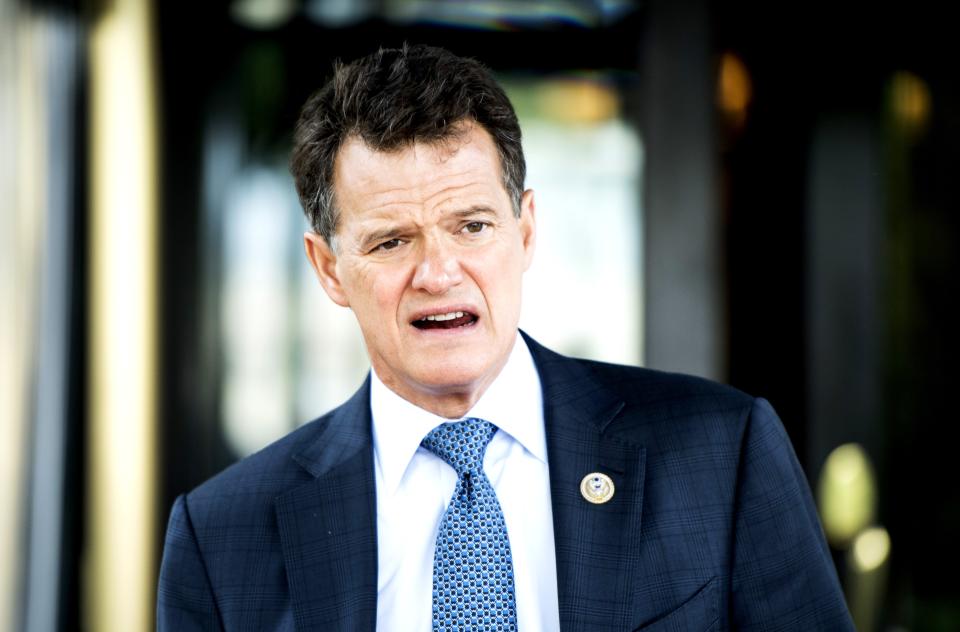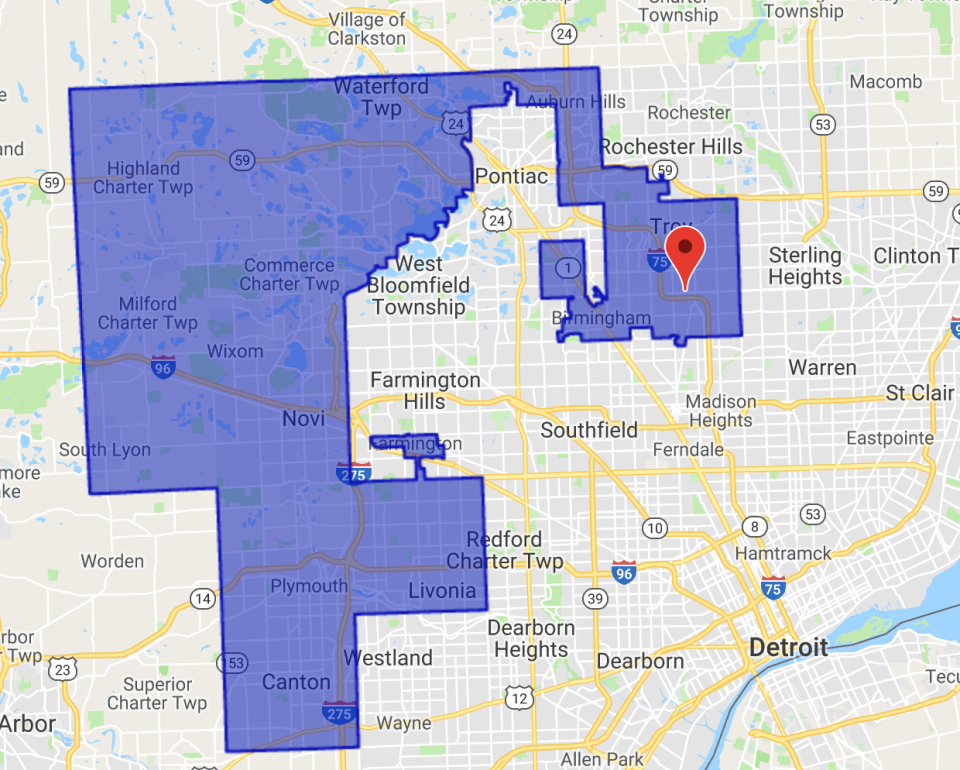How the Democrats Can Flip the House in the 2018 Midterms, Part 10
Over the ten weeks between Labor Day and Election Day, as Democrats and Republicans battle it out for control of the House, we're taking a look at 30 of the most competitive races in the 2018 midterms: Where are these key districts, and what are they like? Which member is trying to keep their job? Who wants to take it away? And for whom might generous donations of your valuable time and money make the greatest difference, if you were so inclined to make them? Democrats need to win only 23 seats to earn the gavel for the next two years, and nothing terrifies Donald Trump and friends more than what they plan to do with it.
You can read earlier installments of this series at the end of this post, or a complete guide to the 2018 Senate races here.
Michigan 11th: Two millennial women make their pitches to America's auto industry

Rep. Dave Trott
Bill ClarkThe district: An collection of absurdly-gerrymandered suburbs to the west of Detroit. Remember how Colin Allred is trying to win a district in Texas that looks like a dog? This thing is like... one of those lab-shower-and-eyewash-station combinations in a high school chemistry classroom, maybe?

It's about 10 percent Asian, and five percent black. It's pretty wealthy. (Average household income: $107,646). It went for Obama in 2008, but for Romney and Trump in 2012 and 2016, respectively.
The incumbent: Dave Trott, a two-term congressman who once referred to town hall attendees protesting his attempts to take health care away from poor people as "un-American crap." Trott is retiring in order to "spend more time with his family" and "return to the private sector" (as he explained when he announced in September 2017), and because he is tired of dealing with Donald Trump (as he admitted a few months later).
The contenders: A pair of thirtysomething women, neither of whom have sought elected office before. Your Republican is Lena Epstein, a 37-year-old local businesswoman who co-chaired Donald Trump's 2016 campaign in Michigan. Afterwards, she penned a fawning op-ed in which she praised the president-elect's "ability to lead by example and embody unity," which may have been, in retrospect, a tad premature. The Democrat is 35-year-old Haley Stevens, the former chief of staff to Obama "car czar" Steve Ratter, who oversaw the Great Recession bailout of the auto industry. She's running on a Medicare public option and a $15-per-hour minimum wage.
The Obama-vs.-Trump proxy fight: Both candidates have strong ties to the most influential sector of the local economy: Epstein's company is a well-known auto lubricant manufacturer, while Stevens helped save Chrysler and GM from liquidation. And by virtue of the their employment history, it's easy to see the race as one between the president and his predecessor, which is slightly better news for Stevens. Earlier this year, Epstein was calling Trump "the best president in American history" and openly pondering joining the Freedom Caucus if she were to win; these days, she's praising Congress' "many tremendous caucuses" and professing her desire "to be working across the aisle." The unity shtick was a little too soon; this shtick might be a little too late.
Florida 26th: Carlos Curbelo is the most vulnerable Republican in the country

Rep. Carlos Curbelo
Bill ClarkThe district: The Everglades, and the Florida Keys! It only took one season of gazing in awe at Bloodline's gorgeous establishing shots for me to insist to my wife that we needed to drive the 127-mile Overseas Highway from Miami to Key West, and it remains one of the neatest places I've ever seen. (Long stretches of it feel like someone dropped the Bay Bridge in, well, a tropical paradise.) It's about 72 percent Latino, and half of its residents were born outside the United States. Hillary Clinton won it by 16 points (!) in 2016.
The incumbent: Two-term Republican congressman Carlos Curbelo, who has spent two years walking one of the most politically perilous tightropes in the country. He's trying his hardest; Curbelo backed a post-Las Vegas effort to ban bump stocks, condemned the administration's family separation policy, and even introduced a carbon tax bill. (It wasn't great, but still.) And along with Arizona congresswoman and Democratic Senate candidate Kyrsten Sinema, Curbelo co-founded the Future Caucus to try and unite millennials in Congress across party lines. (He spoke to GQ about it in June 2017.)
The challenger: Debbie Muscarel-Powell, an Ecuadorian-born immigrant and longtime nonprofit fundraiser who mounted a better-than-expected 2016 state senate campaign in her district, and this time wants to represent it in D.C. She's been playing up Curbelo's vote to repeal the Affordable Care Act, and has pledged to protect Medicare against the forthcoming Republican attempts to gut it. Muscarel-Powell lost her father to a shooting when she was 24, and is a vocal proponent of gun safety proposals that her opponent, independent though he may be, won't support. She has also outraised Curbelo during the campaign's stretch run, prompting prognosticators to move the race to a late toss-up.
Results matter: Curbelo has worked to position himself as the neutral referee of Capitol Hill—literally, in a recent campaign ad. "The left blocked my DREAMers solution," he says. "I called them out, and kept working. The right didn't do enough for our environment, or school safety. I called that one too."
The ad fails to acknowledge that his "DREAMer solution" was, as the Miami New Times noted, a PR stunt that proposed "draconian cuts" to legal immigration and allocated billions for the border wall; it also fails to acknowledge that, uh, everyone on the basketball court hates refs. But Curbelo's fundamental problem is that his constituents want more than a congressman who talks about climate change—they want one who can do something about climate change. Even though he's more moderate than just about every Republican incumbent we've covered in this series, his inability to deliver on his promises has placed his job in jeopardy.
Iowa 3rd: A first-time candidate campaigns in 2020's most important city

Rep. David Young
Bill ClarkThe district: The state's southwest corner, from the Omaha suburbs to Des Moines and its environs. Anytime a prominent Democrat visits here for any reason, check to see if the theirname2020.com domain has been registered yet, and if not, sit on it and see if you can make a buck. Trump won by 3.5 points in this middle-income, mostly white district that Obama took home twice.
The incumbent: David Young, who like many Iowa Republicans has been struggling with the fact that Donald Trump's trade war is absolutely hammering the state's agricultural industry. He's been voicing his frustrations with the back-and-forth, retaliatory nature of tariffs, and the White House's recent decision to lift restrictions on summertime use of high-ethanol gasoline was seen largely as an olive branch to angry Iowans caught in the middle of the president's harebrained strategy.
The challenger: Des Moines native and small business owner Cindy Axne, who like many Iowa Democrats has been thrashing her opponent in the fundraising battle of late. On the campaign trail, she's discussed how she and her husband had to sell their things on eBay in order to pay hospital bills after the birth of their second child, and she supports a Medicare public option as "the best opportunity to get to universal coverage."
Sportsball: It's tough to find an interview with Cindy Axne in which she doesn't proudly mention her days playing something called "6-on-6" hoops as a kid. It turns out that sport this was an institution in Iowa women's high school athletics for decades until the early 1990s; teams are divided into three guards and three forwards, but the trick is that guards must stay in the backcourt and play defense, while forwards must stay in the frontcourt and are the only ones who can shoot. No one can dribble more than twice before passing or shooting, so the ball is constantly flying back and forth, and it's...pretty dang riveting to watch! (In this interview, one Denise Long discusses the time she put up 110 points in a single game against poor Dows High School! Eat shit, Wilt Chamberlain!)
If Cindy Axne wins, I ask her to bring co-ed 6-on-6 with her to Washington; if Ted Cruz wins, I ask her to dunk on him as often as humanly possible.
Utah 4th: Mia Love should win, but she might lose anyway
The district: Parts of Salt Lake City and its suburbs to the south. It's white, but maybe not as white as you'd guess after hearing "parts of Salt Lake City and its suburbs to the south." (80 percent.) Romney beat Obama by 37 points in 2012, which was still his smallest margin of victory in the entire state; in 2016, though, disaffected voters went 39 percent for Trump, 32 percent for Clinton, and the balance for "Someone else, please, for the love of God."
The incumbent: Two-term Republican Mia Love, a 42-year-old black Mormon born to Haitian immigrants in Brooklyn, who today finds herself largely abandoned by the party of which she is nominally a member. The only GOP member of the Congressional Black Caucus, she denounced Trump's child separation policy, opposes his trade war, and even expressed support for gun safety bills after Parkland. Also: "I can't defend the indefensible," she said in January, after he labeled her parents' country of origin a "shithole." She characterized his comments as racist and "unkind," and declared that he "must apologize to both the American people and the nations he so wantonly maligned."
He did not do any of these things.
The challenger: Ben McAdams, a former state senator and current Salt Lake County mayor. (Yes, the county and county have separate mayors. I don't know why either!) He has the type of platform you'd expect of a 43-year-old Mormon Democrat: Most notably, he identifies as pro-life, which is an important issue for this socially conservative electorate. But McAdams splits with his opponent on things like repealing Obamacare (she's for it, he isn't), the tax bill (same), and same-sex marriage (he supports it; she was "very disappointed" by the Supreme Court's decision and promised to continue to "battle in support of Utah and American families," neither of which are groups that were affected by that decision, but whatever.)
Mia Love has a Donald Trump problem: This is a deep-red district, but the contest became a toss-up in the campaign's final weeks because all those voters who couldn't bring themselves to back the president in 2016 don't seem to have much interest in holding the line in 2018. As noted by the Salt Lake Tribune's Robert Gehrke, about twice as many new Democrats as new Republicans have registered in the district over the past two years, and polling shows that McAdams is handily beating Love among independents and even siphoning away 15 percent of Republicans. Americans are tired of living in Trumpland, and 2018's true coin-flip races, just having that little (R) next to your name might be enough to lose you an election.
Previously in "A House-Flipper's Guide to the 2018 Midterm Elections":
Part 1: Illinois 6th, California 10th, Maine 2nd
Part 2: New York 19th, Kansas 2nd, California 25th
Part 3: Kentucky 6th, California 39th, Ohio 1st
Part 4: Iowa 1st, Virginia 7th, Washington 8th
Part 5: Colorado 6th, Michigan 8th, Kansas 3rd
Part 6: New Jersey 3rd, Texas 32nd, New York 22nd
Part 7: California 48th, Minnesota 1st, Texas 7th
__Part 8: __ North Carolina 9th, Minnesota 8th, Illinois 12th
Part 9: California 45th, New Jersey 7th, Minnesota 2nd


